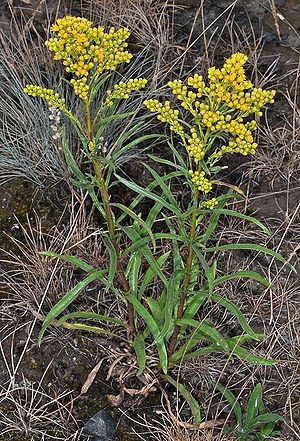Difference between revisions of "Solidago missouriensis"
From Puget Prairie Plants
(→Taxonomy) |
(→Uses) |
||
| Line 30: | Line 30: | ||
==Uses== | ==Uses== | ||
| + | Native Americans chewed leaves and flowers of this plant to relieve sore throats, and chewed roots to relieve toothache. | ||
| + | <ref>Stubbendieck, J., S.L. Hatch and L.M. Landholt. | ||
| + | 2003. North American Wildland Plants: A Field Guide. University of Nebraska Press, Lincoln and London.</ref> | ||
| + | |||
==Propagation== | ==Propagation== | ||
==Photo Gallery== | ==Photo Gallery== | ||
==References== | ==References== | ||
<references/> | <references/> | ||
Revision as of 11:50, 14 May 2012
Contents
Taxonomy
- Kingdom - Plantae – Plants
- Subkingdom - Tracheobionta – Vascular plants
- Superdivision - Spermatophyta – Seed plants
- Division - Magnoliophyta – Flowering plants
- Class - Magnoliopsida – Dicotyledons
- Subclass - Asteridae
- Order - Asterales
- Family - Asteraceae – Aster family
- Genus - Solidago L. – goldenrod
- Species - Solidago missouriensis Nutt. – Missouri goldenrod
Description
General: Glabrous perennial from a creeping rhizome, 2-9 dm. tall.
Leaves: Leaves tending to be triple-nerved, the basal ones oblanceolate, up to 30 cm. long and 3 cm. wide, the others smaller and becoming sessile upward.
Flowers: Involucre 3-5 mm. high; rays usually 8, yellow.
Bloom Period
Late June-October
Distribution
Southern British Columbia and western Washington, east to Ontario and Tennesse.
Habitat
Rather dry, open places, from the valleys and plains to fairly high elevations in the mountains.
Uses
Native Americans chewed leaves and flowers of this plant to relieve sore throats, and chewed roots to relieve toothache. [2]
Propagation
Photo Gallery
References
- ↑ http://plants.usda.gov/java/profile?symbol=SOMI2
- ↑ Stubbendieck, J., S.L. Hatch and L.M. Landholt. 2003. North American Wildland Plants: A Field Guide. University of Nebraska Press, Lincoln and London.

